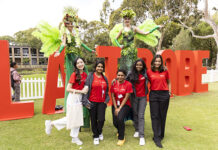Australians will soon get to vote in a referendum on whether to change the Australian constitution by establishing a body called the Aboriginal and Torres Strait Islander Voice.
If the Aboriginal and Torres Strait Islander Voice is approved in the referendum on Saturday 14 October, its existence will be written into the Australian constitution, meaning successive governments cannot overturn it.
But what is the Aboriginal and Torres Strait Islander Voice and how would it work?
The Australia Government has prepared information about the Voice on its website here: www.voice.gov.au. The information below has been sourced from this website.
The Aboriginal and Torres Strait Islander Voice, or the Voice for short, would be a permanent and independent body to provide the Australian Government and Parliament advice on issues affecting Aboriginal and Torres Strait Islander people.
While the Voice will advise the government, it will not have veto powers – meaning it will not be able to block legislation.
The Voice will be able to make recommendations about improving programs and services, but it will not manage money or deliver services.
The Voice could be expected to give advice on:
- How Aboriginal and Torres Strait Islander people live in Australia
- How the laws affect Aboriginal and Torres Strait Islander people
- How the Government can help Aboriginal and Torres Strait Islander people
The Voice would be accountable and transparent and would work alongside existing groups and organisations.
Members would serve for a fixed term and can be sanctioned or removed for serious misconduct. Members would also fall within the scope of the National Anti-Corruption Commission.
Members of the Voice will be chosen by First Nations people and would be representative of Aboriginal and Torres Strait Islander communities, gender balanced and include young people.
Members would be chosen from each state, territory and the Torres Strait Islands and would have specific remote representatives and representation from the Torres Strait Islander mainland population.
If the referendum is approved there will be a process with Aboriginal and Torres Strait Islander communities, the Parliament and the broader public to settle the Voice design.
The Australian Electoral Commission (AEC) has released a yes/no case pamphlet which contains cases for and against the proposed change to the Constitution. You can find more information on the AEC yes/no case pamphlet webpage.
La Trobe resources to help keep you informed
To help you learn more about the referendum, the Constitution, Treaty and more, The La Trobe Law School students and staff have created these handy videos:
- What is a referendum?
- What does the Constitution currently say?
- Can we achieve the Voice through legislation?
- What is the Uluru Statement from the Heart?
- What is Treaty?
- How many referendums have we had?
- What was the 1967 referendum about?
See also:
You can also find out more about the Voice on the Australian Government website.















